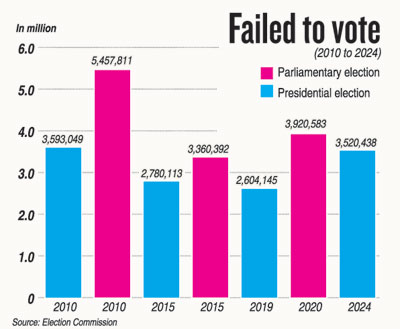News
3m who did not vote shows need for laws to protect franchise
View(s):By Niranjala Ariyawansha
In last week’s presidential election, the fact that 20.5% of the registered voters have not cast their ballot has raised concerns about voter participation.
A total of 17,140,354 (17.14 million) voters were registered, but 3,520,438 (3.5 million) have not cast their vote. The Election Commission of Sri Lanka points out that this cannot be interpreted as a good trend in a democratic society.
Chairman of EC, R. M.A. L Rathnayake told the Sunday Times that many factors such as the lack of confidence in the voting system and the lack of knowledge and interest in it due to a large number of Sri Lankans leaving the country for foreign jobs in the past may have led to a certain percentage not voting.

“There are more than 3.5 million people who registered and did not vote in this presidential election, but it is a difficult and complicated process to classify them accurately,” he points out.
In the 2019 presidential election, 2,604,145 (16.2 %) of the 15,992,096 registered voters, did not cast their vote. In the 2015 presidential election, 15,044,490 voters have qualified, but 2,780,113 (18.4%) did not vote.
However, Manjula Gajanayake, executive director, Institute for Democratic Reforms and Electoral Studies(IRES), says that in every election, there are people who do not come to cast their ballot, which is not surprising.
“In every election, there is a group of people qualified to vote but do not come to vote. In fact, 26 lakhs of those who vote outside the electoral process are those who work in the Middle East and another 600,000 are skilled workers who work in developed countries. Who are the remaining 3 lakhs? Under the RTI Act, on August 5, 2020, we came to know that there were 8,500 trawlers in the deep sea, and there are 5-6 fishermen on each trawler, so there will be 50,000 such people on the day of the presidential election also,” he noted.
He points out that around 15,000 young people work in supermarkets all over the island and despite the law, those people are not given the opportunity to vote.
“Also, there are 150,000 people in the investment zones because the transportation costs are high, so they don’t go to their villages to vote. Only in Colombo, about 100,000 people work in the private security service. They do not get an opportunity to cast their votes and journalists and doctors and other essential services also have this problem. Due to all these problems, all those mentioned professions are unable to cast their votes.”
He also believes some may not have voted because they are disappointed by the splits in some parties.
A process similar to postal voting provided to the 700,000 government employees engaged in election duties should be provided to those in essential services in the public and private sectors, he said.
Announcing the results of the presidential election, Mr Rathnayake appealed to President Anura Kumara Dissanayake to implement proposals that the EC had presented to previous governments as soon as possible.
“We were able to implement some of our proposals in this election. One can register for a vote under an additional list as soon as they reach the age of 18. Now because of this decision, 76,000 young people got the opportunity to vote this year. If all our proposals are implemented, more than half of these problems will be solved,” Mr. Rathnayake said.
“We submitted these proposals 15 years ago to the committee chaired by former Member of Parliament Dinesh Gunawardena, many of these proposals were not passed in the Parliament for reasons unknown to us. According to him many proposals are stuck here and there.’’
The former president had appointed a committee chaired by former Chief Justice Prayasad Dep, but it appears that the proposal has not been implemented.
Mr Rathanayaka suggesed special polling stations for essential service workers like doctors, journalists, private security personnel, and highway staff to allow them to vote the day before or on election day.
“For example, in a place like the National Hospital, we have proposed a polling booth called advance voting system to cast votes the day before the elections. This is an alternative to the postal voting system.’’
He emphasised that it is the responsibility of the government to provide the necessary legal provisions to protect the right of voters.
The best way to say that you found the home of your dreams is by finding it on Hitad.lk. We have listings for apartments for sale or rent in Sri Lanka, no matter what locale you're looking for! Whether you live in Colombo, Galle, Kandy, Matara, Jaffna and more - we've got them all!

